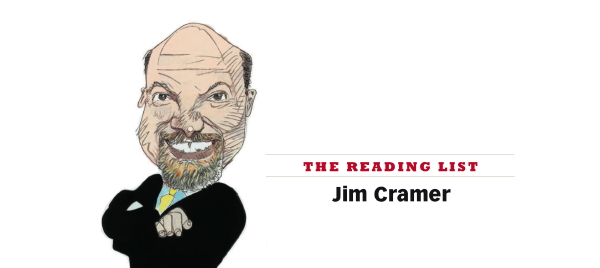
‘I am obsessed with World War II,” writes Jim Cramer, the host of Mad Money with Jim Cramer on CNBC. “Literally obsessed. I try to read every new book that merits even a couple of stars on Amazon, and I am on automatic-buy pilot whenever anything by Anthony Beevor, Ian Kershaw, or Richard Evans hits the presses.
“Although my father served bravely in the Sixth Army in the Pacific, I gravitate toward the European Theater, endlessly mesmerized by events like the Russians’ desperate stand at the Barrikady weapons factory in Stalingrad, or the stunningly successful opening hours of Operation Barbarossa. I will never stop trying to understand the horrors of the Holocaust—not that it lends itself to any human kind of understanding. The debates about the success of daylight precision versus nighttime saturation bombing, first heard of as a boy while watching the fabulous television show Twelve O’clock High, still captivate me, and I endlessly try to calculate the worth of the aerial bombing of Nazi Germany to hold up our end of the bargain with Stalin in the race to wipe the Third Reich from the face of the Earth.
“With that in mind, here are the books that represent the best of the best, the unbelievably well-researched texts that are also great reads even if you aren’t as insatiable as I am about the only topic that really matters.”
Thunder in the East
Evan Mawdsley (2007)
“For those of us descending from the school of western theater supremacy popularized by British historian Basil Liddell Hart, as all of us Baby Boomers were, the revelations of the importance of the Eastern Front remain breathtaking. The journey toward a more balanced view of the war begins with British historian John Erickson, then morphs to German historian Paul Carell, but finally ends squarely at the doorstep of Evan Mawdsley. His Thunder in the East shocks even the most jaundiced observers with the horror of total war. The best-researched book yet to come out about where the war was truly won.”
Stalingrad
Anthony Beevor (1998)
“For those who want to put the titanic and, yes, satanic struggle that was Stalingrad in the perspective of both everyday soldiers and the prosecutors of the war, look no further than Beevor’s electrifying text. You are in the granary, outlasting the Germans, you are fighting for space on the last outgoing flights from the Pitomnik airfield. This is the real deal.”
Nazi Germany and the Jews, Volumes 1 and 2: The Years of Persecution, 1933–1939 and The Years of Extermination, 1939-1945
Saul Friedländer (1997 and 2007)
“I laud the attempts by conventional educators to teach everyone in this country about the Holocaust. The lessons are often learned by reading Anne Frank’s poignant diary, or the fictional The Book Thief, both admirable attempts to capture the cataclysm in human terms. If I had my druthers, Friedländer would be required reading for all. This is a remarkable history of the Holocaust that truly causes you to ponder whether Hitler went to war not for world domination but to exterminate the Jews. I have had many a nightmare about scenes Friedländer describes; I will leave it to you to read the otherwise indescribable terrors that he has researched better than anyone alive.”
The Coming of the Third Reich, The Third Reich in Power, and The Third Reich at War
Richard Evans (2003, 2005, and 2008)
“Searching for the single best history of the Third Reich? Richard Evans’s trilogy is impossible to top. His combination of a social, historical, political, and cultural narrative makes for the most compelling of all the “war” books I have ever tackled. The moment I finished the trilogy I turned around and read it again, this time examining the footnotes and bibliography for more information. He’s marvelous.”
Hitler 1889–1936: Hubris and Hitler 1936–1945: Nemesis
Ian Kershaw (1998 and 2000)
“There have been dozens of excellent biographies of arguably the worst man who ever lived. But none has ever come near the magnificent two-volume set by the fabulous Ian Kershaw. I pity those who even try. Amazingly well-written and researched, this two-part biography will be the gold standard of Hitler
biographies for as long as we live.”
But Not for the Fuehrer
Helmut Jung (2004)
“I love soldier memoirs, whether they be the well-known Helmet for My Pillow by Robert Leckie or Forgotten Soldier by Guy Sajer or Crossing the Line by Alvin Kernan. You don’t need me to point you to those. But this no-holds-barred tale of barbarism by an obscure German soldier is among the most eye-opening of autobiographies outlining man’s inhumanity to man ever written. Either Jung was too honest to lie, or what he doesn’t tell was even more horrific than what he
chronicles. Either way, it’s a must read.”




